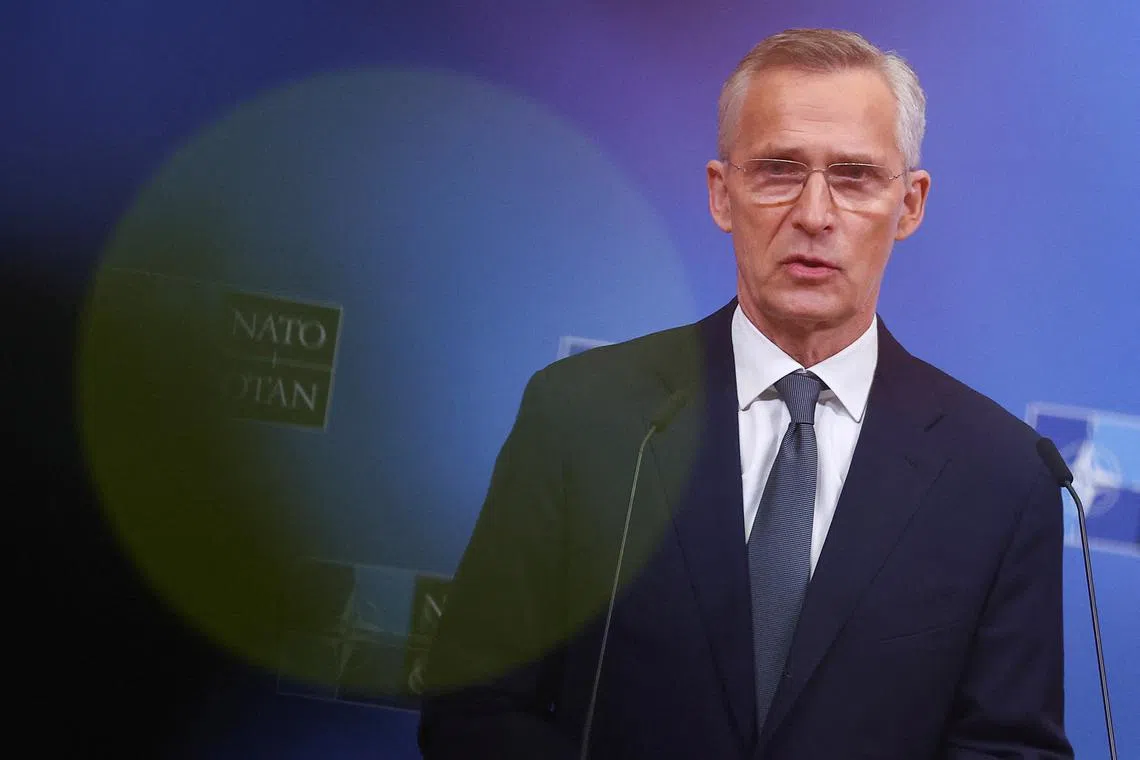Nato ministers mull over $146 billion military fund for Ukraine
Sign up now: Get ST's newsletters delivered to your inbox

The proposals by Nato secretary-general Jens Stoltenberg would give the Western alliance a more direct role.
PHOTO: REUTERS
BRUSSELS - Nato foreign ministers met on April 3 to discuss how to put military support for Ukraine on a long-term footing, including a proposal for a €100 billion (S$146 billion) five-year fund and a plan seen as a way to “Trump-proof” aid for Kyiv.
The proposals by Nato secretary-general Jens Stoltenberg would give the Western alliance a more direct role in coordinating the supply of arms, ammunition and equipment to Ukraine as it fights Russia’s invasion,
“We need to shift the dynamics of our support,” Mr Stoltenberg said as he arrived at the Brussels meeting.
“We must ensure reliable and predictable security assistance to Ukraine for the long haul, so that we rely less on voluntary contributions and more on Nato commitments; less on short-term offers and more on multi-year pledges.”
He said Russia “needs to understand that they cannot achieve their goals on the battlefield and they cannot wait us out”.
He declined to confirm levels of funding and said the aim was for a decision to be taken at a July summit of Nato leaders.
The plan from Mr Stoltenberg would see a Nato mission take more control of coordinating arms supplies to Kyiv from a US-led grouping that currently helps oversee support.
Officials said that could help insulate the flow of weaponry to Ukraine from a potential return of former president Donald Trump to the White House in November.
Until now, Nato as an organisation has focused on non-lethal aid for Ukraine out of fears that a more direct role could trigger an escalation of tensions with Russia. Its members have provided billions of dollars in arms on a bilateral basis.
Diplomats said there was a growing view within Nato that it was time to put military aid to Ukraine on a more sustainable footing, and Nato was best placed to do that.
But they said it was unclear whether the €100 billion figure would be accepted or how it would be financed. Nato decisions require consensus among its 32 members.
Arriving at the talks, German Foreign Minister Annalena Baerbock described the proposal as “right and important”, saying aid for Ukraine should be disbursed via “reliable, long-term structures”.
Latvian Foreign Minister Krisjanis Karins also welcomed the €100 billion fund proposal, suggesting that contributions could be a percentage of each member’s gross domestic product.
But in a sign that a decision may not be easy, Hungary signalled scepticism about some elements of Mr Stoltenberg’s proposal.
Foreign Minister Peter Szijjarto “firmly stated Hungary will not back any Nato proposals that might draw the alliance closer to war or shift it from a defensive to an offensive coalition”, government spokesman Zoltan Kovacs said on X.
Belgian Foreign Minister Hadja Lahbib said ministers would discuss the feasibility of Mr Stoltenberg’s proposal and what each could contribute.
US Secretary of State Antony Blinken, who is attending the Brussels meeting, said in Paris on April 2 that Nato was looking at measures that could serve as the “necessary bridge” to membership of the alliance for Ukraine.
Nato has stated that Ukraine cannot join while it is at war with Russia, but that it will become a member at some point.
Mr Stoltenberg’s pitch comes as Ukraine’s forces are struggling to hold back Russia in the face of dwindling supplies from Kyiv’s Western backers.
A US$60 billion (S$81 billion) US funding package is currently stalled in the US Congress, but there are hopes lawmakers could move to pass it in the coming weeks.
“It is vital to us that Ukraine wins and (Russian President Vladimir) Putin loses,” Britain’s Foreign Secretary David Cameron said.
“Their defence, their security, is an investment in our defence and our security.”
The meeting comes as Nato is seeking a new leader to succeed Mr Stoltenberg, who has held the position for nearly 10 years.
Dutch Prime Minister Mark Rutte has the backing of some 90 per cent of Nato members for the job – including the US, France, Britain and Germany – according to diplomats.
But he faces opposition from Hungary – which objects to his criticism of Prime Minister Viktor Orban’s government – and a late challenge from Romanian President Klaus Iohannis.
Some diplomats had hoped to choose Mr Stoltenberg’s successor at the Brussels meeting, but they said more time would now be needed.
But several expressed confidence that Mr Rutte would be appointed in the end. REUTERS


